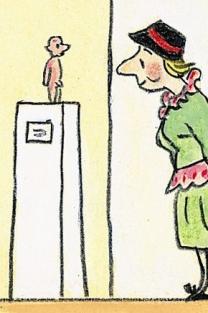Yet again I was too busy to digest the Bachmann prize contenders’ texts in advance and come to my own conclusion. Every time I switched on or played back, the texts seemed rather pedestrian and descriptive. The NZZ referred to belangloser Realismus, which seemed right (links in Perlentaucher).
I liked the winning entry by Tilman Rammstedt a lot, but perhaps it won by default. It was notable that only men won prizes, although probably justified in this case. I had the chance of listening to it live, but the reading was dreadfully fast and irritating.
As mentioned before, the texts can be read in English (and other languages) this year. Here’s the winning one.
So what translators did they choose? Only two into English: Martin Chalmers, who has translated Jelinek, Kluge, Enzensberger, Klemperer and more, and Stefan Tobler, who translates from German and Portuguese.
I can’t say I’ve spent long reading the translations, and what I have seened looked OK – in any case, the texts are not of the most demanding kind. But my suspicions were aroused by the translation of Wissenschaft as science at the beginning of the text by Dagrun Hintze (I would have chosen the adjectives academic or scholarly for wissenschaftlich).
Du hast vergessen, wie man das auseinander hält, Definition für Definition, aber wundern kann dich das nicht, mit der Wissenschaft gab es von Anfang an diese Schwierigkeit, dieses Fehlverhalten auf deiner Seite, weißt du noch, der Dozent in Bart und Sandalen, gleich unter die erste Hausarbeit nur ein Satz, dafür in Rot, dein erstes präzis formuliertes, scharlachfarbenes Waterloo: Das ist kein wissenschaftliches Arbeiten. Du hingegen hattest gedacht, der Text würde leuchten, als Beispiel, und so verflucht viel Brillanz bei einer Erstsemesterin, stattdessen dieser scharlachfarbene Satz, du hast zwei Wochen zu Hause gelegen, geheult, den Dozenten dann nicht mehr gegrüßt, das Seminar penibel geschwänzt, als ob das irgendwas nützte.
You have forgotten how to distinguish between things, definition by definition, but that shouldn’t surprise you, you always had this difficulty with science right from the start, this abnormal behaviour, do you remember the bearded, sandal-wearing lecturer, just one sentence at the bottom of your first essay, but in red, your first, precisely formulated, scarlet Waterloo: This is not a scientific approach. You, however, had thought that the text shone, was a beacon, for a first semester student so damned full of brilliance, instead that scarlet sentence, you lay at home for two weeks, you wailed, then didn’t ever say hello to the lecturer again, embarrassingly you skived the seminar, as if that helped.
I’m not sure who’s going to be reading these translations. Perhaps it will start with the Goethe Institutes. Perhaps Klagenfurt has a broader competition in mind in future – an amazing and probably doomed idea.
Don Dahlmann links to a list (German) of tips on how to win and how to lose the competition – I’m not sure of their origin (the ‘open mike’ recommendation didn’t work this time:
Pluspunkte:
Autorenporträt und Textform:
1. Lastenausgleich: Autor hat nicht in der NVA gedient
2. Lastenausgleich: Autor ist kein junges Mädchen
3. Lastenausgleich: Autor hat am Leipziger Literaturinstitut studiert
4. schnörkelloser Lebenslauf ohne Preise, ohne Aufenthalte, ohne Hobbys (“Schreiben”, “Breakdance”, “Leichenwaschen”)
5. Gute Typo
6. Autor ist Träger interessanter Preise (Stipendium der Raketenstation Hombroich, Walter-Fick-Preis)
7. Keine “open mike”-Teilnahme / Teilnahme wird im Lebenslauf verschwiegen
…
Minuspunkte:
Autorenporträt und Textform:
1. Multiple Wohnorte in der Biografie (jeder Wohnort > 1 bringt einen Minuspunkt)
2. Hand im Gesicht auf dem Autorenfoto
3. Lastenausgleich: Autor sieht außergewöhnlich gut aus
4. Brücken, Flüsse, Seen, Ufer im Autorenporträt
5. Bahnhöfe, Züge, Gleise, Bahnsteige, Flughäfen im Autorenporträt
6. Rolltreppen, Rollbänder, Aufzüge, Großaufnahme gehender Füße im Autorenporträt
7. Bücherregale im Autorenporträt



